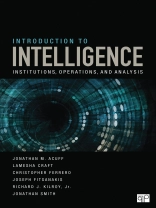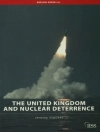Introduction to Intelligence: Institutions, Operations, and Analysis offers a strategic, international, and comparative approach to covering intelligence organizations and domestic security issues. Written by multiple authors, each chapter draws on the author′s professional and scholarly expertise in the subject matter. As a core text for an introductory survey course in intelligence, this text provides readers with a comprehensive introduction to intelligence, including institutions and processes, collection, communications, and common analytic methods.
Mục lục
Preface
Acknowledgments
About the Authors
Chapter 1. Introduction
What Is Intelligence?
The Purpose of Intelligence
Conclusion: The Promise and the Limitations of Intelligence
Key Concepts
Additional Reading
Chapter 2. Intelligence History
Intelligence From Antiquity to the Westphalian State System
Intelligence in Late Medieval and Early Modern Europe
Intelligence in America From the Revolution to Pearl Harbor
World War II and the Birth of the Modern
The Cold War
Intelligence in the 21st Century: 9/11 and Its Aftermath
Conclusion: Assessing Over 3, 000 Years of Intelligence History
Key Concepts
Additional Reading
Chapter 3. Intelligence and Security Institutions: Organizations and Processes
An Illustration of Intelligence Support
The National Security Framework in the US System
The Growth of the National Security Bureaucracy
Intelligence Organizations in the US System of Government
The Intelligence Cycle and Its Critics
Conclusion: Critiques and Alternative Approaches
Key Concepts
Additional Reading
Chapter 4. Comparative Intelligence Systems
Cases in Intelligence Studies
The United Kingdom
French Republic
Federal Republic of Germany
Israel
Russian Federation
People’s Republic of China
Conclusion: Similarities and Differences of Foreign
Key Concepts
Additional Reading
Chapter 5. Intelligence Operations
How Do We Collect Intelligence?
Complexity and Challenges of Contemporary Intelligence Operations
Intelligence Collection Planning
The Five Principal Intelligence Collection Disciplines and Beyond
Military Intelligence
Conclusion: Intelligence Operations Summary
Key Concepts
Additional Reading
Chapter 6. Counterintelligence
The World of Espionage and Intrigue
Counterintelligence Roles and Missions
Defensive Counterintelligence
Offensive Counterintelligence
Contemporary Challenges for Counterintelligence
Conclusion: Counterintelligence Summary
Key Concepts
Additional Reading
Chapter 7. Covert Action
Types of Covert Action
Oversight of Covert Action in the United States
The US Military and Covert Action
Conclusion: Considerations in Covert Action
Key Concepts
Additional Reading
Chapter 8. Cyberspace Operations and the Information Environment
Convergence of Technology
Peeling Back the Layers of Cyberspace
The US Cyber Strategy
Analyzing Cyber Threats
Conclusion: The Complexity of Threats in the Cyberspace Domain
Key Concepts
Additional Reading
Chapter 9. Intelligence Regulation and Governance
Mc Carthyism and the Second Red Scare
Domestic Intelligence and COINTELPRO
The Watergate Scandal
The Church and Pike Committees
Intelligence Oversight After Watergate
Intelligence Oversight in Practice
The Separation of Powers in Intelligence Oversight
Conclusion: An Imperfect but Indispensable System
Key Concepts
Additional Reading
Chapter 10. Inter-Agency Communications
The Inherent Tensions in Intelligence Communications
Communications Challenges in Intra-Agency Settings
Communications Challenges in Inter-Agency Settings
Products for Intelligence Consumers
Getting the Attention of Intelligence Consumers
Retaining the Attention of Intelligence Consumers
Conclusion: Making Intelligence Useful
Key Concepts
Additional Reading
Chapter 11. Intelligence Analysis
Epistemology and Intelligence Analysis
Forecasting and the Challenges of Prediction
Psychological Biases and Intelligence Analysis
Conclusion: From the Philosophy of Science to Practice
Key Concepts
Additional Reading
Chapter 12. Analytic Methods
The Contemporary Context of Intelligence Analysis
Methods Used to Analyze Intelligence Targets
Presenting Findings: The Structure and Voice of Written
Conclusion: Patterns of Recruitment and Training of Intelligence Analysts in the US Intelligence Community
Key Concepts
Additional Reading
Chapter 13. The Ethics of Intelligence
Of Ethics and Moral Systems
Case Studies
Conclusion: The Ethical Demands of National Service
Key Concepts
Additional Reading
Chapter 14. Threats to the United States and Its Interests
Strategic Competitors
Pandemics
Climate Change as a Driver of International Instability
Cyber Threats in the 21st Century
Inter-state War
Ethnic Conflict, Revolution, and State Destabilization
Weapons of Mass Destruction
Terrorism
Criminal Networks
Conclusion: Of Threats and Priorities
Key Concepts
Additional Reading
Index
Giới thiệu về tác giả
Jonathan C. Smith is a professor in the intelligence and national security studies program at Coastal Carolina University, which he established in 2011. He also serves as the Educational Practices Committee chairman for the International Association for Intelligence Education. In addition to his teaching activities, Dr. Smith served in the US Navy Reserve as an intelligence officer. In a 23-year career, he deployed in support of operations in Bosnia, Kosovo, Iraq, Afghanistan, and the global war on terrorism. His last assignment was as the commanding officer of Joint Intelligence Operations Center 0174 at the US Southern Command in Miami, Florida. Dr. Smith received his master of arts in international studies and his doctorate in political science from the University of South Carolina. He also earned a certificate in the Joint Professional Military Education program of the US Naval War College.












